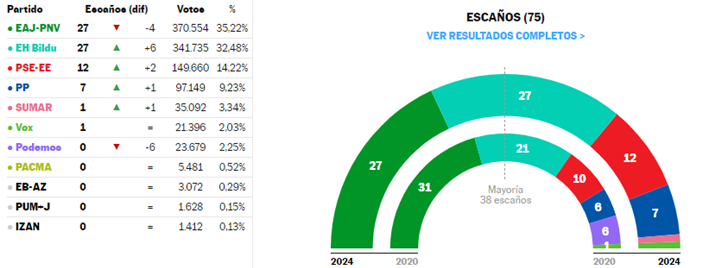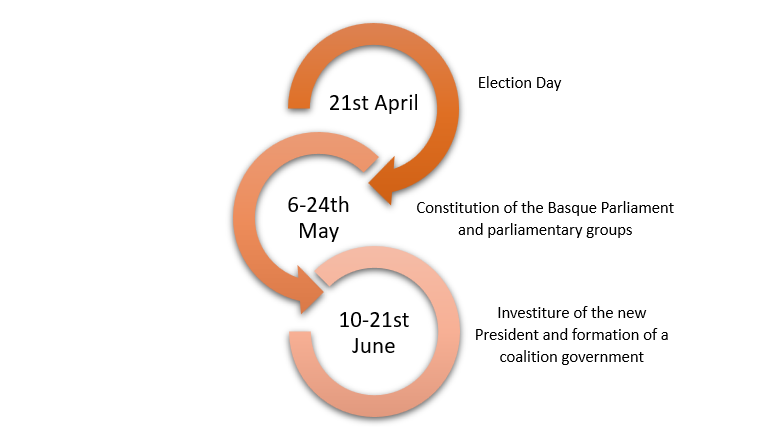
By: Natalia Pérez Mas, Account Executive and Social Media Manager.
.
The Basque Nationalist Party (PNV) has won the elections with 35.2% of the votes and 27 MPs, so they could reedit a new coalition government in the region together with the Socialist Party. Both add 39 MPs, one more than the absolute majority needed to stand on their own. However, although the PNV loses 4 MPs with respect to the 2020 elections, it faces the growth of the radical pro-independence left party, EH Bildu, which has also obtained 27 MPs, but with a support of 32.5% of the votes.
The Socialist Party consolidates its third position and reaches 12 MPs, two more than in 2020. In addition to the PNV and EH Bildu, the Socialist Party is the third winner of the elections as it will once again be in the coalition government, the party also increases its representation in the Basque Parliament and it will be the key to the government that will make the PNV candidate the new regional President (lehendakari).
On the right-wing parties, despite the good moment that the conservative Popular Party (PP) is experiencing at regional level, the formula is not repeated in the Basque Country. The PP gets 7 MPs, one more than in 2020, and fails to snatch the only MP of the far-right party, VOX, which only manages to keep its first representative from the last elections.
SUMAR, the left-wing party that governs at the national level together with the Socialist Party, achieves 1 MP. A result that represents a symbolic victory of the party of the Vice-President of the Government of Spain, Ms. Yolanda Díaz, against the previous representation of the left, Unidas Podemos, which fails to have representation in the new Parliament of the Basque Country.

Another interesting fact is the participation percentage, which has reached 62.5% of the inhabitants of the Basque Country: 11 points more than in the previous elections of 2020.
Analysis of the results
Despite the fact that the Basque Nationalist Party has won the elections by obtaining the largest number of votes, one of the big winners has also been the radical pro-independence party, EH Bildu, which has become the main left-wing force in the region, far ahead of the Socialist Party.
However, despite the strong rise of EH Bildu, there will be no change of political cycle in the Basque Country. The PNV together with the Socialist Party, which already warned during the electoral campaign that it would not support EH Bildu, will once again govern in coalition.
At the national level, these results are very positive for the Prime Minister, the Socialist, Mr. Pedro Sánchez, since it not only justifies the support of his party to the Basque Nationalist Party (having been the most voted party); but it also guarantees the national support of the nationalists to the current coalition government. We recall that, at the national level, the coalition government between the Socialist Party and SUMAR, is sustained on the parliamentary support of parties such as the PNV, EH Bildu and pro-independence parties in Catalonia such as ERC or Junts Per Catalunya, among others. The support of the Socialist Party to the PNV, at first, will not harm the relationship of the Socialists with EH Bildu either, since the left-wing party is satisfied, by now, to be constituted as the main opposition party.
However, the Basque Parliament, with a majority of nationalist forces (PNV and EH Bildu), will be able to make stronger and more forceful requests to the State Government regarding the transfer of competences to the region.
Timeline
Once the elections have been held on 21st April, it will not be until at least next 6th May, when the elected MPs will be definitively proclaimed by the Electoral Boards. The constitution of the new Parliament of the Basque Country will be 15 days after one third of the MPs have collected their credentials and the parliamentary groups will be constituted in the following five days (13rd-24th May). The investiture of the new regional leader could be after the European elections on 9th June, since, although there is no predetermined date for this, it is normally two months after the elections.
Until then, the new regional President will probably not have formed a government; therefore, there will not be a new regional cabinet until mid-June. However, we expect that during this time there will be announcements from those most sympathetic to the new President.

Healthcare: the crucial issue for the new Basque government
Mr. Imanol Pradales, candidate of the Basque Nationalist Party, will be the next President of the Basque Country and will lead a coalition government with the Socialist Party. In this new government, there is the possibility that the current Regional Minister of Health, Ms. Gotzone Sagardui, will not repeat her position as she has not been close to the new PNV leader during the election campaign and she was not part of the party’s lists. Furthermore, Ms. Sagardui has had some disagreements with Mr. Pradales during the last weeks, defending the actions of her team during the last years.
At the moment, no names are being considered to replace Ms. Sagardui, if she does not continue in the position. What is practically certain is that the PNV will once again lead the Health Department, which has been one of the party’s main priorities during the election campaign. Among its most important actions in the short-term are a Shock Plan to improve Primary Care and waiting lists, a Basque Agreement on the health system and the creation of a specialized medical care institution for the treatment of chronic diseases. The party also includes a Training Plan for health professionals and the QBihotz program, with the application of Quantum Machine Learning for early detection of cardiovascular pathologies.
However, in recent days, the Socialist Party has asked for more prominence in the future new coalition government, and its participation in the Health Department may also be a possibility. The Socialist Party measures may also be taken into consideration such as the elaboration of a new Oncology Plan of the Basque Country: implementing active screening programs in the region (breast, cervix, colorectal) and extending organized screening to three more cancers (prostate, lung and gastric). The Plan also includes the integration of the ‘Onkologikoa’ (Oncology Institute of the region) within the regional health system, to become the reference in the diagnosis and treatment of cancer. On rare diseases, the Socialist Party adds the extension of the number of pathologies covered by the Neonatal Screening Program, to implement the data field of the Rare Diseases Registry of the Basque Country or to guarantee rapid access to the diagnosis of rare diseases.
The Socialist Party is also committed to draw up a Regional Plan for Personalized Precision Medicine, a new Chronicity Strategy for the Basque Country; in addition to the implementation of the Health Research and Innovation Strategy 2022-2025. This strategy, already under development, includes increasing resources for research projects and strengthening collaboration between the public health system, universities and the pharmaceutical and bio-sanitary industry.
Conclusion
In the Basque Country it is expected that there will be a government by mid-June; but before that, the regional elections in Catalonia and the European elections will be held; so they will surely be taken into account in the negotiations of the new coalition government which will be formed, as everything indicates, by the Basque Nationalist Party and the Socialist Party.
In the negotiations that will last about two months, there are several important battles to manage: the possibility of EH Bildu demanding a space in the government, the demand for greater competences by the Socialist Party to the Nationalist Party or the improvement of the public health service as the main starting point of the new coalition government.
.
Every month, Influence Spain provides a look at Spanish current affairs. For more information, join our social media profiles on Twitter and LinkedIn.

